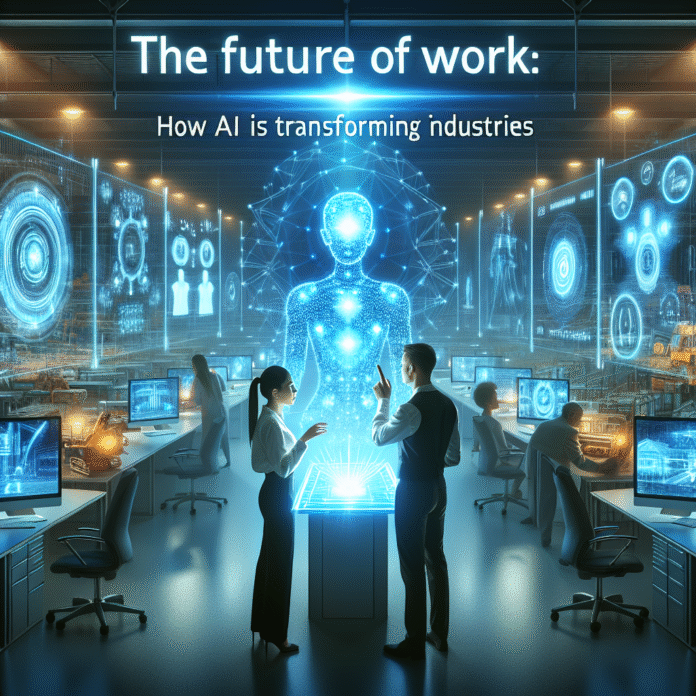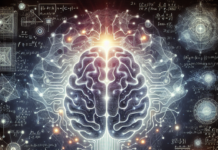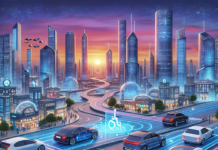The Future of Work: How AI is Transforming Industries
As we navigate an era characterized by rapid technological advancement, the landscape of work is evolving at an unprecedented rate. At the forefront of this transformation is artificial intelligence (AI), a powerful tool reshaping how industries operate and redefining the nature of jobs. From automating mundane tasks to providing data-driven insights, AI is not just enhancing productivity but also fostering innovation and creativity across various sectors.
Automation: More Than Just Replacing Jobs
One of the most significant impacts of AI in the workplace is automation. Traditionally seen as a force that would reduce the number of available jobs, AI is actually transforming the nature of work rather than eliminating it. Routine and repetitive tasks are increasingly being handled by machines, allowing human workers to focus on more complex, strategic responsibilities.
For example, in manufacturing, AI-driven robots can undertake assembly line tasks with precision, while human workers can engage in quality control and design improvements. The true potential of AI lies in collaboration—robots and machines are becoming teammates, enhancing human capabilities rather than fully replacing them.
Enhanced Decision-Making with Data Analytics
Another area where AI is making significant strides is in data analysis. Businesses generate vast amounts of data daily, and leveraging this information for decision-making is crucial. AI algorithms can process and analyze data far more efficiently than humans, uncovering patterns and insights that inform strategic decisions.
In sectors like finance, healthcare, and marketing, AI tools are enabling organizations to predict customer behavior, identify potential risks, and optimize supply chains. For instance, in healthcare, AI algorithms assist doctors in diagnostics and patient care by analyzing medical records and suggesting personalized treatment plans. This not only enhances patient outcomes but also increases the efficiency of healthcare systems.
Revolutionizing Customer Experience
AI is transforming customer service by providing personalized experiences through chatbots and virtual assistants. These tools can handle inquiries 24/7, offering immediate support and freeing up human agents to tackle more complex issues. Companies like Amazon and Netflix utilize AI to analyze customer preferences, providing tailored recommendations that enhance user engagement and satisfaction.
This shift toward a more personalized customer experience signifies a fundamental change in how businesses interact with their clients. By leveraging AI, companies can foster loyalty and build stronger relationships, ultimately leading to increased revenues and market share.
Upskilling and Reskilling the Workforce
As AI continues to reshape industries, there is an increasing demand for a skilled workforce adept at leveraging these new technologies. Organizations are recognizing the need to invest in upskilling and reskilling their employees to prepare them for a future dominated by AI. This transition entails not only technical training but also cultivating soft skills such as creativity, emotional intelligence, and critical thinking—attributes that AI cannot replicate.
Educational institutions are also adapting their curricula to include AI and data literacy, ensuring the next generation is better equipped for the evolving job market. Lifelong learning is becoming essential as workers seek to stay relevant and thrive in an AI-augmented workplace.
Ethical Considerations and Challenges
While the benefits of AI in the workplace are manifold, they are accompanied by challenges that require careful consideration. Issues of data privacy, algorithmic bias, and the ethical use of AI are paramount. Organizations must develop frameworks to ensure responsible AI practices that safeguard employee rights and foster inclusivity.
Moreover, as AI takes on more roles, society must address the potential displacement of workers in certain sectors. Proactive policies are needed to support those affected, ensuring a just transition.
Conclusion
The future of work is undeniably being shaped by AI, presenting both opportunities and challenges across industries. As automation transforms routine tasks, enhances decision-making, and revolutionizes customer experiences, organizations must prioritize workforce development and ethical considerations. Embracing AI as a partner rather than a replacement will pave the way for a collaborative and innovative future, ensuring that human creativity and ingenuity remain at the heart of work. In this unfolding landscape, adaptability and a commitment to continuous learning will be vital for both individuals and organizations to thrive in the AI-driven era.
Related video- The Future of Work: How AI is Transforming Industries







